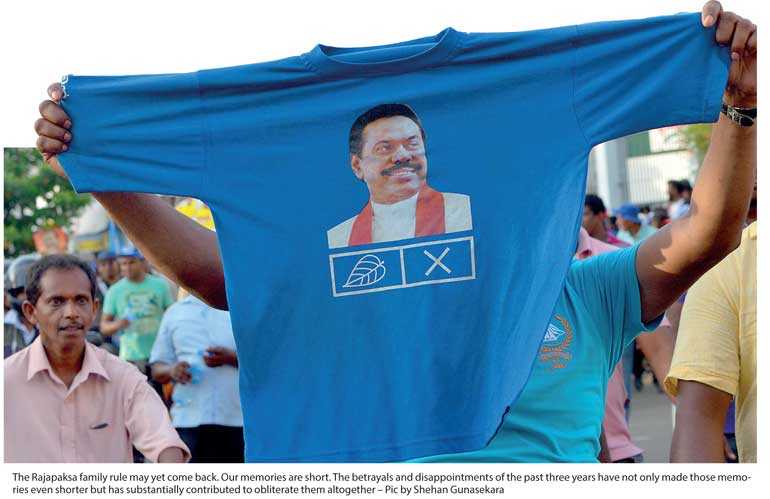Friday Feb 20, 2026
Friday Feb 20, 2026
Wednesday, 5 September 2018 00:00 - - {{hitsCtrl.values.hits}}

 “Evil is unspectacular and always human And shares our bed and eats at our own table” – W.H. Auden
“Evil is unspectacular and always human And shares our bed and eats at our own table” – W.H. Auden
Tyrants, dictators, despots and autocrats don’t just fade away. When ousted from power they discover new virtues in democracy and leverage mobs and oligarchs to reacquire their positions of domination on a larger and more destructive scale.
In the past three years of scandal plagued deeply dysfunctional democracy we have forgotten what it was like to live constantly under government coercion. Today three years after, we take our liberties for granted. The decade of unfreedom is erased from our collective memory.
The threat looms large and loud. One oligarch at a recent parley that was labelled a ‘fireside chat’ at the Colombo Hilton openly called for a ‘little bit of a dictator’ to make things smooth for the rich to get richer. His logic was spookily soft! There is no such thing as a little bit of evil.
This essay is an exploration of our current political discourse wherein everyone is doing what they think is somehow justified. That includes those now in power, those who hope to regain their lost power and those convinced that they alone are entitled to power.
Patriotism as our experience has shown is a virtue of the vicious.
‘Evil’ is an accusatory adjective that calls for some explanatory reasoning. Most people do things which somehow later turnout to be evil and remembered as evil.
‘Who is Lasantha?’ Gotabaya Rajapaksa famously asked BBC’s Stephen Sackur. It was not arrogance of power. It was the evil of power. Trivialising human life is wrong. Trivialising murder is evil.
Lasantha Wickrematunge met with evil in 2009 just before the carnage of the civil war ended. Richard de Zoysa’s tryst with evil was in 1990 just seven years after the pogrom of July 1983 that more or less unleashed the hell and hellfire that lasted another two decades.
Journalist Poddala Jayantha is the most recent victim of evil that lived to narrate his encounter with evil.
“They cut my hair and put it into my mouth, then gagged me. They struck both my legs, breaking one at the ankle. They used a piece of wood to smash the fingers on my right hand until they bled. They said, ‘This will stop you from writing’. They eventually let me go, saying ‘We won’t kill you now, but if you organise any more demonstrations against the Government, if you speak to the media, we will kill you’.”
Finger pointing is not the purpose of this essay although it may appear to be so, given the illustrative episode cited.
What is attempted is another quest for our collective moral compass amidst the drift to nowhere after a decade of unfreedom and three years of inchoate and chaotic freedom with the kleptocracy entrenched more than ever. It is a fairy tale that has no fairy tale ending.
The King saw the ‘Evil’ in all its monstrous complexity and terror. Together with his brothers he formed a great army to destroy the evil and rescue the land from imminent peril. The war was savage, but its intent was pure. Many died but the King remained true to his goal and refused to turn from the course he had set.
It was a humanitarian war against an opponent whose evil the likes of which, the world had not seen before. The people saw the armies the king put in to the battle. They cheered their benign bravery. They sang hymns of praise for their deep-rooted humanism. The king was truly a Great King. The enemy was dead. But evil lived on, for evil does not die in battle. Evil dies with the dead and lives with those who survive, for it can survive only in a human heart that beats and evil has the genius of adhering to the rhythm of the human breast. It is a clever usurper of the space reserved for the human conscience.
The fairy-tale where the goblin of evil defeats the good fairy is relevant to our post war politics. The post 2009 trajectory of our flawed democracy is clear evidence that evil results can flow from good motives.
Post war peace time evil
The war ended unleashing a torrent of rampant nationalism. What is attempted here is to understand the post war peace time evil that has gripped us since the end of the armed conflict. The raw political divisions that has emerged since the end of the military conflict contains adequate quantities of evil that makes this survey a national imperative.
Make no mistake. We created the edifice of tyranny and evil. Impeaching the chief justice was a politically motivated vindictive act but did not amount to evil.
When the chairman of the parliamentary select committee that found her guilty Anura Priyadharshana Yapa went to the gates of the residence of the ousted CJ to partake in a ‘Kavun & Kiribath’ feast, that was pure unadulterated ‘evil’. It was even greater evil when he decided to accept cabinet office in the subsequent ‘Yahapalanaya’ dispensation.
When the Defence Secretary – a nominal public servant ordered the navy to stage a firework display in the Diyawanna Lake to mark the ouster of the Chief Justice, it was unmitigated, unimaginable evil. The two instances are minor examples that demonstrate that evil is a composite of both villainy and intent.
We the people obeyed in advance and created an evil monster. Most of the powers of the tyrant were freely given by us. In those troubled times, the people willingly allowed themselves to be co-opted in the fight to prevent greater evil. What we failed to realise was that we were teaching power what it can do to whom we despised and to us when peace was restored.
We allowed our institutions to be dismantled. We never imagined that the 17th Amendment could be tinkered with. The then opposition walked out on the debate on the 18th Amendment. That they did not march in to the well of the house in protest was not evil but qualifies to be a sneaky endorsement of evil.
A democracy fighting terrorism must necessarily resort to some degree of violence, observe some protocols of secrecy and be willing to abrogate some citizens’ rights.
While, this was sound strategy at the time of fighting the war, it carried with it the seductive allure of absolute power that made the ruling family run berserk after the end of the war.
The end of the war brought a peace that did not reduce the power or the scope of the surveillance state. It hardly impacted the security regime. Freedom of expression was a luxury that was affordable to those ready to play hide and seek with the goons of the state intelligence apparatus.
Dissent was treason. Detractors were traitors. Insularity was the patriotic benchmark. A ‘weltanschauung’ that transcended the patriotic tunnel vision of the ruling family was the sole prerogative of the quintessential ‘pariahs’ amidst the Sinha-le tribe!
Independent Sri Lanka had many leaders. None can match the élan with which Mahinda brought his immediate family members in to pivotal positions of the state making them exclusive arbiters and monopoly holders of power in the fields of commerce [brother Basil] and ‘legitimate physical violence’ [brother Gotabaya]
“It is the people who decide. What can I do if the people want them?” was the savvy, suave and slippery response retort of Mahinda – the master of the art of coerced consent.
Politics is not evil, only
politicians turn evil
We have often heard the refrain that ‘politics is evil’, or the lament about the ‘evil of politics’. We know what they are talking about, but we miss the most significant fact about ‘evil’. It distorts the rational choice of those who wield political power. Politics is not evil, only politicians turn evil. Because politics is about masses and mobs the collective evil is reflected through the masses and the mobs manipulated by those engaged in politics.
The war is over. The lessons of the war are remembered. The war compelled the state to use fear to manipulate and control. The war made fear an instrument of power.
When we are afraid, we obey. When afraid we either obeyed or remained passive in order to be safe. That is how we lived before 8 January 2015.
Mahinda Rajapaksa had a simple governance style. He expected the people to be grateful for the value and the rewards of ensuring our larger self-interest – that of our country in general and Sinhala Buddhists in particular.
He taught his family the importance of ensuring the self-interest of the Rajapaksa clan. He taught his political stooges the importance of upholding their natural self-interest and that of his political machine – the party.
Fighting terrorism is fighting evil. There is no harm in that proposition. One may even go further and claim the necessity for fighting evil with greater evil. But often that is not the way the dice fall. Some of the worst things done to human beings are done with the best will in the world. In a democracy blindness to evil can also be equally evil. Subverting institutions that guard against evil is the greatest evil of all.
The Rajapaksa family rule may yet come back. Our memories are short. The betrayals and disappointments of the past three years have not only made those memories even shorter but has substantially contributed to obliterate them altogether.
The Rajapaksa family regime was a ruthless juggernaut that demolished or abridged our freedoms with a bewildering ferocity that its total recall is now nearly impossible for those who watched it from the sidelines. Only those who carry the deep scars care to remember them today.
An evil government that shaped public perceptions and manufactured consent
It was an evil government that shaped public perceptions and manufactured consent. That it was dislodged in 2015 was more of an accident than a deliberate design. We forget that reality at our peril.
Contrary to the popular legend the Italian Niccolò Machiavelli was no villain. He was a pragmatic theorist of human nature. His advice has great purpose and relevance to what we face today.
“Now in a well-ordered republic it should never be necessary to resort to extra-constitutional measures; for although they may for the time be beneficial, yet the precedent is pernicious, for if the practice is once established of disregarding the laws for good objects, they will in a little while be disregarded under that pretext for evil purposes. Thus, no republic will ever be perfect if she has not by law provided for everything, having a remedy for every emergency and fixed rule for applying it.”